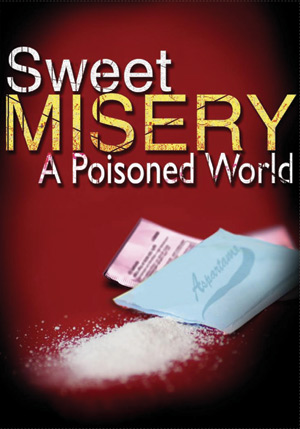- Kim Evans -
NaturalNews -
 Americans spend about 90 percent of their total food budget on processed foods - and we wonder why we have a health care crisis. Besides being enzyme deplete, processed foods are often crammed with chemicals, including colors, flavors and preservatives. Apparently, many people don`t think twice about filling themselves and their children with chemicals, so let`s look at the effects of just a couple of them.
Americans spend about 90 percent of their total food budget on processed foods - and we wonder why we have a health care crisis. Besides being enzyme deplete, processed foods are often crammed with chemicals, including colors, flavors and preservatives. Apparently, many people don`t think twice about filling themselves and their children with chemicals, so let`s look at the effects of just a couple of them.
Aspartame
Aspartame is common in diet sodas; it`s also found in chewing gum, sweets, and diet foods. It`s even sold in packets as chemical sweeteners and placed on most restaurant tables. Actually, aspartame is found in about 6,000 foods on grocery store shelves.
The fact that aspartame was once listed by the Pentagon as a biochemical warfare agent should be all the information you need to avoid it. But if you need more, have a look at these rats fed aspartame daily. http://myaspartameexperiment.com/in...
This experiment was done by a woman concerned about the amount of aspartame her family was consuming. Each day, she fed 108 rats the amount of aspartame in two-thirds of an 8-ounce serving of diet soda, when adjusted for size. In less than three years, 37 percent of the female rats developed tumors. The pictures speak for themselves.
Of course, this begs some serious questions. If this woman was getting these results at home just by putting aspartame in the rats` water, what does it say about the scientists who tested aspartame for safety before it inundated the food supply - or about the government agency that approved its use?
In addition to tumors, aspartame is associated with brain damage and nervous system disturbances; it also affects brain development in fetuses.
BPA
BPA has been in the headlines lately; it`s often used in making baby and water bottles. The chemical then leaches into the liquids inside. BPA is also used in the lining of tin cans, and it`s being found in canned foods. Even if you are eating otherwise healthy green beans or peas - if it`s canned, it`s likely contaminated with BPA.
Consumer Reports took a look and found BPA in several popular canned foods:
Green Beans: 35.9 to 191 ppb
Vegetable Soup: 67 to 134 ppb
Chicken Noodle Soup: 54.5 to 102 ppb
BPA is dangerous even in small amounts; it`s been linked to reproductive abnormalities, diabetes, neurological problems, heart disease, and cancer. A recent look at the umbilical cord blood of newborns found BPAs there, pointing loudly to the widespread nature of the problem. When you start adding up how many brain damaging chemicals are eaten by or injected into the average person, is it any wonder that 1 in 110 children born these days have an autism related disease?
Why are Many Chemicals Connected with Cancer?
Have you ever wondered why chemicals so often create tumors? It`s because the body isn`t designed to remove so many man-made chemicals. Toxic chemicals are commonly found inside cancers, and cancers are a way your body corrals all of the chemicals most people eat and are exposed to, along with other toxic crud, to keep it out of your bloodstream.
If you`re interested in avoiding cancer in your life - and the pain and enormous price tag associated with conventional treatments, a large part of the answer is in avoiding as many chemicals as possible. This includes avoiding as many processed foods as possible to limit your chemical exposure dramatically, and this will leave nature`s protective, cancer-fighting foods as your options. You`d be surprised at what some simple diet and lifestyle changes can do for the last few decades of your life.
More:
http://www.sustainabletable.org/iss...
http://www.theecologist.org/investi...
http://www.encyclopedia.com/video/c...
http://myaspartameexperiment.com/
http://www.consumerreports.org/cro/...
http://www.ewg.org/minoritycordbloo...
http://www.healthyeatingadvisor.com...
http://www.springerlink.com/content...
No comments:
Post a Comment